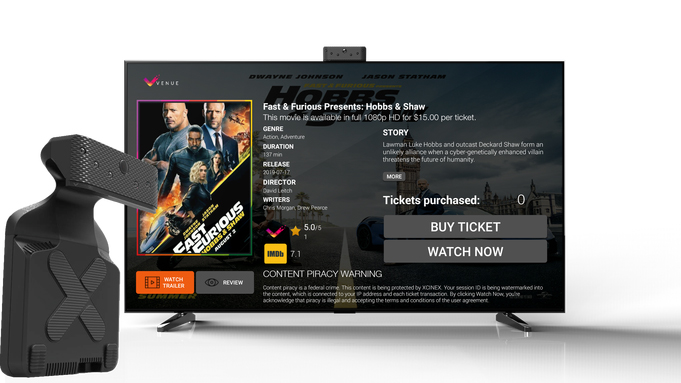Back in June, a press release crossed my desk from a company called Xcinex (pronounced “scene-ex”). The release touted Venue, a new movie and streaming service with a twist: It counts the number of viewers and charges accordingly, just like a movie theater would sell tickets. I didn’t pay much attention at the time, but a new press release arrived a few days ago and the PR firm is now soliciting interviews with Xcinex execs. (Say that five times fast!)

According to the company’s Web site,
“…Venue is a next-gen streaming media player that has an optic sensor to provide a premium Pay-Per-Viewer™ streaming experience through its proprietary Venue streaming app. In addition to Venue’s premium offering, consumers can access all their other favorite streaming apps, gaming apps, as well as video conferencing services.”
In other words, you buy the Venue player for $60, connect it to a 2016-model TV or later through an HDMI port, and place the camera – uh, sorry, “optic sensor” – atop your TV. When you log into the Venue service to watch a movie or TV program (or pay-per-view sports, concerts, etc), the “optic sensor” (oh, let’s just call it what it is, a camera) counts the number of people in the room and charges your account accordingly.
And apparently Xcinex has thought of everything, for if three people are in the room when the program starts playing and a fourth viewer walks in, the playout will stop. From the Venue FAQ page:
“How does Pay-per-Viewer™ work? When you use the Venue streaming app and pick something to watch, you’ll need to buy tickets for each viewer. You can purchase tickets for everyone or each viewer can buy tickets individually. If Venue detects more people in the room than tickets purchased, content will pause until the ticket count equals viewer count.”
Quoting from a June 20 story in Deadline,
“…Couples or families looking to stream an original musical or specialty film can support theaters by paying per viewer instead of a flat rate. If only two kids in a family want to watch an animated title and their parents didn’t, they could be the only ones “ticketed.” (A grace period allows those unaccounted for to drift through the room for a couple of minutes without being charged.)”
Until now, pay-per-view events have either had very high purchase prices, encouraging group viewing, or had a flat rate price per screening, regardless of how many viewers are present. Venue describes itself as a solution in the middle; recouping lost movie theater ticket revenue caused by the COVID-19 pandemic.
Apparently the company assumes that many people will not be going back to movie theaters any time soon (I share that belief), and with super-large 4K HDR TVs cheaper than ever (how’s a 65-inch Samsung 7-series for $500 sound?), some will NEVER go back. With a large TV and a surround soundbar (especially one compatible with Dolby Atmos), you can create a pretty nice experience at home.
The Spy in the Living Room
We know from past experience that consumers do not like the idea that their TV could be spying on them. Venue insists their system is secure and encrypted and only counts bodies (would my two cats sitting on the couch count as well?), and that the “count” data is ephemeral like SnapChat, disappearing once the transaction is completed.
If you believe that, I have oceanfront property in Arizona to sell you. Although there is some big money behind the company, they are absolutely swimming against the tide with this concept. Look at how many people took a test drive with Disney+ for $6 to watch Hamilton over and over again – and a few million decided to stick with the service afterward. Disney+ probably has the most valuable library of movie content anywhere; all of which can be viewed by one or one hundred people for one flat rate per viewing.
Think back to Samsung’s PR issues with its built-in cameras. Think of all the stories of people wondering if their TV is recording what they’re saying during a movie or TV show. Think of the people who have put their smart TVs on VPNs to get around geographic restrictions on content availability, such as happened during the 2012 London Olympics when viewers in the U.S. used VPNs to access the BBC coverage instead of NBC’s coverage. As Ann Landers once said,
a suit of armor is no defense against a can opener.
The emphasis on connectivity with model year 2016 or later TVs is interesting, but not spelled out. Presumably, it has to do with HDMI 2.0 compatibility for streaming 4K content, or implementation of HDCP 2.2. And if you are one of those holdouts still using a projector in your home theater, you’re out of luck for now – Venue won’t work with projectors, although the company says a compatible system is coming in the future.
I’ll close by reminding you of numerous TV shows and movies where bank and museum robbers get around closed-circuit cameras by taking a photograph of an empty room or hallway and placing it in front of the camera. How long will it take some enterprising individual to figure out a way to fool Venue in a similar manner, if the service even makes it to market? (I’m betting it won’t…) PP


